UK, France, Germany Call On Iran To Stop Nuclear Escalation
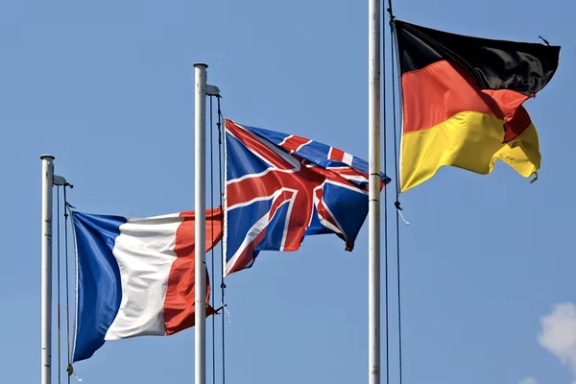
The UK, France and Germany called on Iran to stop and reverse its nuclear escalation, return to full cooperation with IAEA and seize the offer on the table without further delay.

The UK, France and Germany called on Iran to stop and reverse its nuclear escalation, return to full cooperation with IAEA and seize the offer on the table without further delay.
Criticizing Iran’s installation and use of additional advanced centrifuges and the removal of the International Atomic Energy Agency’s JCPOA-related surveillance and monitoring equipment, they said some of the most serious steps to accelerate the pace of Tehran’s nuclear program have been taken during the negotiation process aimed at returning Iran and the US to the Joint Comprehensive Plan of Action.
Expressing deep concerns over Iran’s increasing uranium stockpiles enriched to 20-60 percent purity, the E3 said, “Iran’s complete termination of key JCPOA-related transparency measures is therefore a particularly negative, counterproductive and provocative step, which the UN Security Council cannot remain silent on.”
They also denounced Iran’s “provocative” launch of the Zolfaqar Satellite rocket, which could be capable of delivering nuclear weapons and can be used to construct long-range and intercontinental ballistic missiles.
“We strongly condemn Iran’s continued destabilizing activity in the region and call upon Iran to stop all ballistic missile activities and proliferation inconsistent with UNSCR 2231,” they concluded.
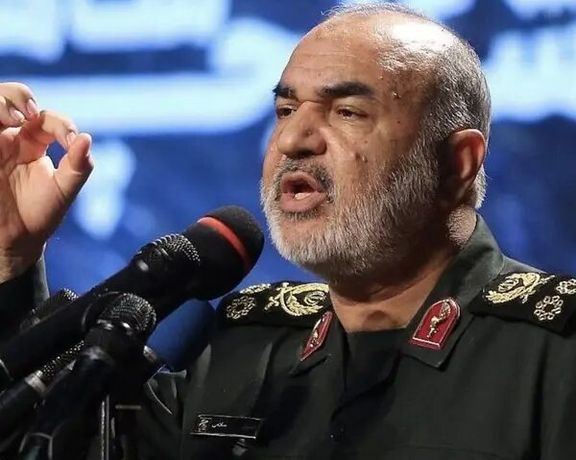
After repeated incidents showing widespread infiltration in its intelligence and security networks reportedly by Israel, Iran’s IRGC admitted its counter-intelligence was targeted.
During a ceremony to introduce the new IRGC counter-intelligence chief on Thursday, Revolutionary Guard’s commander Hossein Salami acknowledged the experience and expertise of Israeli and Western intelligence agencies, saying that “the enemy seeks to strip us of our self-confidence and make us feel empty inside.”
Calling on all commanders, officials and all the Revolutionary Guards to foil enemies’ plots, he said, “This is the most dangerous and mysterious kind of aggression... The enemy's most successful experience is in its intelligence operations."
“The Intelligence Protection Organization of the Islamic Revolutionary Guard Corps is engaged in direct confrontation with all the experienced and skilled intelligence and security services,” Salami said, admitting that they “have the collapse of many regimes on their record.”
On Monday, Brigadier General Majid Khademi, the head of the Defense Ministry’s Intelligence Security, was appointed by the Supreme Leader to succeed Mohammad Kazemi as the new chief of the IRGC Intelligence Organization’s information security (SAS InfoSec).
Kazemi replaced the controversial cleric Hossein Ta’eb as chief of the IRGC Intelligence Organization (SAS). Ta’eb’s replacement after 13 years at the helm of SAS which was announced on June 23 came as a big surprise and fueled many speculations about the reasons for his dismissal.
The SAS IntelSec is responsible for protecting the IRGC against infiltration by undesirable political fractions and leakage of information as well as monitoring of the forces’ commanders and the staff.
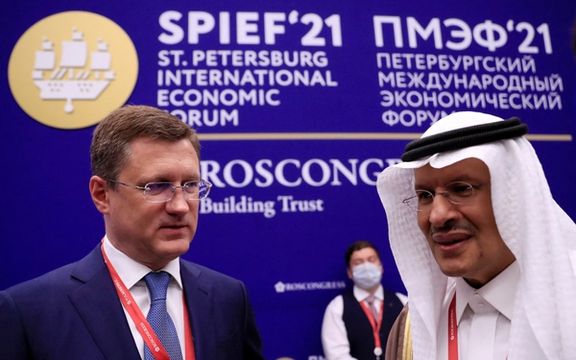
Oil prices rose slightly further Thursday after a brief Opec+ meeting, following an upturn Wednesday with the ending of US-Iran nuclear talks in Doha, Qatar.
Benchmark Brent crude was around $116 a barrel Thursday, with theJoint Ministerial Monitoring Committee of Opec+, led by Russia and Saudi Arabia, rubber-stamping previously agreed quotas in Vienna.
Reuters news agency Thursday cited Iranian officials claiming Tehran had felt little pressure to give way to the United States in Doha. “We are in no rush,” one said. “Our nuclear program is advancing every day. Time is on our side… we want a deal that 100 percent serves our national interests. We want a good deal.”
At the United Nations Security Council in New York, Ireland’s Byrne Nason, the facilitator of resolution 2231, by which the UNSC in 2015 endorsed the nuclear deal (the JCPOA, Joint Comprehensive Plan of Action), reiterated the resolution’s call for “member States…to take such actions as may be appropriate to support the implementation of JCPOA.”
In a statement to the security council, the three European JCPOA signatories – France, Germany, and the United Kingdom – laid all blame for failure to restore the JCPOA with Iran, which they charged had “refused to seize this diplomatic opportunity.”
The US left the JCPOA in 2018, introducing stringent third-party sanctions that the administration of President Donald Trump said would reduce Iran’s oil exports from around 2.5 million bpd to zero. But Tehran has maintained a low level of exports, claiming its oil revenue March 21- May 21 was up 60 percent year-on-year, and has since 2019 expanded its nuclear program beyond JCPOA limits.
‘Keep working’
In announcing by tweet Wednesday the ending the US-Iran Doha talks without the “progress…hoped-for,” Enrique Mora, the senior European Union official coordinating the talks, said “we will keep working with even greater urgency to bring back on track a key deal for non-proliferation and regional stability.”
Iran said Doha had floundered because the US had failed to offer assurances it would not, after returning to the JCPOA, keep what the JCPOA called “discriminatory regulatory and procedural requirements in lieu of the sanctions.” But Foreign Ministry Spokesperson Nasser Kanani said Wednesday that the talks had been “held in a professional and serious atmosphere,” implying the process might continue.
The US State Department said the lack of breakthrough in Doha came from Iran “raising issues wholly unrelated to the JCPOA” and not being ready “to make a fundamental decision on whether it wants to revive the deal or bury it.” There were also suggestions that Iran had raised International Atomic Energy Agency questioning of uranium traces found at three sites used before 2003 – a matter unrelated to the JCPOA, but which led the IAEA board to pass a critical resolution earlier this month.
‘Destabilizing’
Washington’s overall stance was outlined to the Senate in May by Robert Malley, the US special envoy who led US negotiators in Qatar. Malley told senators Washington would continue diplomacy to restore the JCPOA as long as “we assess that the non-proliferation benefits of a return to the deal are worth the sanctions lifting we would need to provide.”
Critics of the JCPOA argue either that benefits never existed or no longer do so. In London, the Daily Telegraph reported Thursday that three former ministers would back a parliamentary motion calling for a fresh agreement that would last longer than the JCPOA, require stricter monitoring, and cover “Iran’s other destabilising [sic] activities in the region,” a reference to its various alliances.
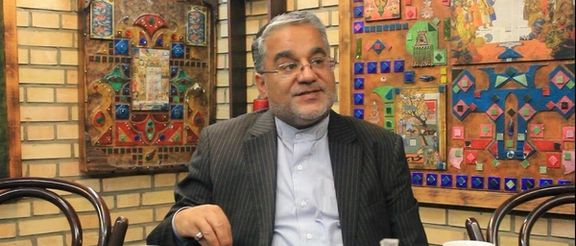
An Iranian foreign ministry expert says the invasion of Ukraine has brought about major changes in international relations and Tehran should adapt itself.
Mojtaba Ferdowsipur, who is the director of West Asian Studies Group at the Iranian Foreign Ministry's Political and International Studies Center, has said in an interview with moderate conservative website Khabar Online on Wednesday, June 29, that in view of recent global developments and Iran's potentials, "the Islamic Republic should replace its offensive positions with defensive postures."
He said that one of the consequences of the war in Ukraine is its impact on energy supply in the world, and this has affected US President Joe Biden’s approach to the Middle east and energy issues, with adopting a realistic view toward West Asia with an eye on the significance of the region's oil reserves.
"One of the reasons for Biden's visit to Saudi Arabia is that the United States needs that country's oil. An increase in Saudi Arabia's oil output will lead to a reduction of prices in the international oil markets. This can largely prevent an energy crisis in the United States," Ferdowsipur said, adding that "this can also affect the Democrats' popularity before the [midterm] elections."
At the same time, Israel wants to use Biden’s trip the region to bring Saudi Arabia into the Abraham Accords, and this would have big impact on geopolitics.
The analyst added that "as a result of the war in Ukraine, international coalitions are no longer based on cooperation. Instead, they are based on a combination of cooperation, cooperation and rivalry. As a result, interactions between Israel and Egypt or between Israel and Turkey are likely to be based on competitions and rivalries."
Although Ferdowsipur avoided explaining what it would mean for Iran to adopt a defensive posture, but the context of his remarks pointed to a foreign policy based on both cooperation and competition, instead of stark choices against or in support of different countries.
Ferdowsipur added that "relying on relations and cooperation with Iran's neighbors may not work for the country. We should adopt a policy of cooperation and competition based on geopolitics." He explained that "Iran should show its weight in in the region's geopolitical developments and make sure that its share from the corridors in the region is respected by others."
Ferdowsipur also pointed out that "If Russia has a 20-year contract with Iran, this does not mean that Moscow will not compete with Tehran in the region's geo-economy." He further explained that "Iran is likely to sustain losses if it does not rely on a combination of cooperation and competition. Thus, tying the country's interests to relations with a single countrywill not secure Iran's interests."
The best example of this occurs in matters relating to the JCPOA. As Iran is a country under sanctions, other countries might change track to evade secondary sanctions, he said.
The analyst maintained that Iran should try to benefit from the geopolitical changes by securing its share of regional corridors in Karabakh region and the North-South corridor Russians are currently using to transport their goods.
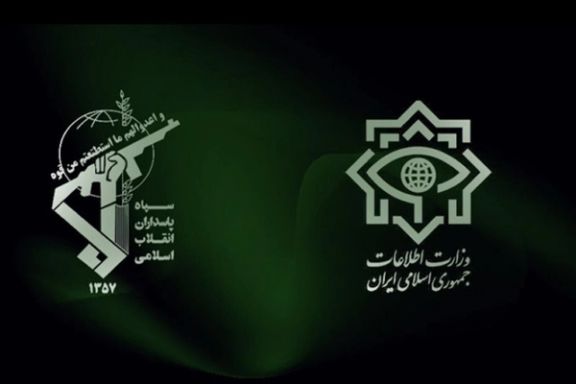
Egypt has reportedly warned Iran not to target Israelis on its territory, demanding to be kept out of the Islamic Republic’s shadow war with Israel.
Citing unnamed sources, London-based pan-Arab daily Al-Arabi Al-Jadeed said on Wednesday that Egyptian security officials warned Iran not to operate on Egyptian soil during recent meetings among intelligence officials.
According to the Qatar-backed media outlet, Egyptian officials warned Iranian counterparts that any attempt to carry out attacks against Israelis in the country would harm ties between Cairo and Tehran.
“Egyptian officials informed their Iranian counterparts that Egypt will not accept the its security reputation to be tied to the ongoing conflict between Tel Aviv and Tehran,” which has flared up following a series of killings of scientists and elements of the Revolutionary Guards as well as several cyberattacks by both sides.
The sources said that “the Iranian side assured Egyptian officials that Iran is keen not to harm the state of peace with Egypt” and that “Israeli allegations about attempts to target Israeli tourists in third countries is a lie,” despite reports that Turkey and Israel recently thwarted attempts to target Israeli civilians in Turkish territory.
“The Egyptian warning to Tehran came after leaks obtained by Cairo from the Israeli side, claiming that Egypt and the UAE are the new likely countries where Iran seeks to target Israelis,” following the failure in Turkey, “which prompted the Iranians to think of alternatives to restore their credibility," Al-Arabi Al-Jadeed reported.
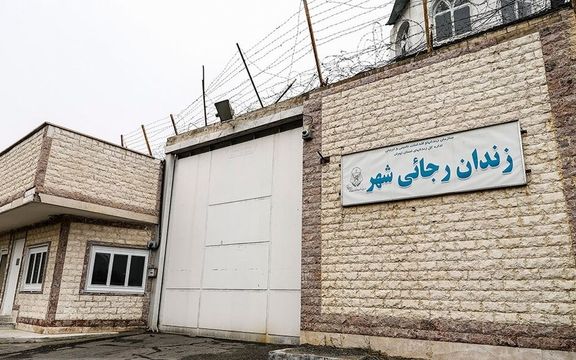
About a week after the execution of eight people in Rajai-Shahr Prison in Karaj, aka Gohardasht Prison, 10 other prisoners were executed in the same jail on June 29.
According to human rights groups, at least 97 prisoners have been hanged in Iranian prisons during the past 40 days.
Earlier in the month, human rights groups said the Islamic Republic hanged 12 Baluchis, including one woman, in Zahedan prison in the southeastern province of Sistan-Baluchestan.
In a communiqué released on Tuesday, the leaders of the Group of Seven (G7) reiterated their shared profound concern over “the continued human rights violations and abuses in Iran,” including arbitrary arrest and detention, as well as Iran’s increased use of capital punishment.
A few days earlier, UN Secretary General António Guterres released a report on the situation of human rights in Iran, decrying “the high number of death penalty sentences and executions” and “reports of death in prison due to denial of adequate and timely medical care.” The UN chief said that the number of executions in Iran increased from at least 260 cases in 2020 to 310 individuals in 2021, and the number continued to rise into 2022.
Earlier in the month, Amnesty International’s annual report on worldwide use of the death penalty showed Iran as a country with a “disturbing spike” in executions.
The 66-page report found Iran executed at least 314 people in 2021, a 28 percent jump from at least 246 in 2020 and the highest figure since 2017. Amnesty said that in Iran “death sentences were disproportionately used against members of ethnic minorities.”